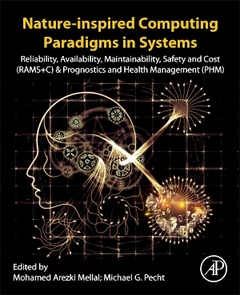Nature-Inspired Computing Paradigms in Systems Reliability, Availability, Maintainability, Safety and Cost (RAMS+C) and Prognostics and Health Management (PHM) Intelligent Data-Centric Systems Series
Coordonnateurs : Mellal Mohamed Arezki, Pecht Michael G.

Nature-Inspired Computing Paradigms in Systems: Reliability, Availability, Maintainability, Safety and Cost (RAMS+C) and Prognostics and Health Management (PHM) covers several areas that include bioinspired techniques and optimization approaches for system dependability.
The book addresses the issue of integration and interaction of the bioinspired techniques in system dependability computing so that intelligent decisions, design, and architectures can be supported. It brings together these emerging areas under the umbrella of bio- and nature-inspired computational intelligence.
The primary audience of this book includes experts and developers who want to deepen their understanding of bioinspired computing in basic theory, algorithms, and applications. The book is also intended to be used as a textbook for masters and doctoral students who want to enhance their knowledge and understanding of the role of bioinspired techniques in system dependability.
Optimization 1. RAMS+C (reliability, availability, maintainability, safety and cost) 2. Optimal design 3. Diagnostic 4. Resilience and vulnerability 5. Prognostics and Health Management (PHM) 6. Risk assessment and mitigation 7. Faults 8. Obsolescence 9. Lifetime and lifecycle prediction
Methods of interest include, but are not limited to 10. Genetic algorithms 11. Particle swarm optimization 12. Differential evolution 13. Cuckoo algorithms 14. Artificial bee colony 15. Ant colony optimization 16. Artificial neural networks 17. Brain 18. Inspired computing 19. Hybrid techniques
He is the founder and director of CALCE (Center for Advanced Life Cycle Engineering) at the University of Maryland, which is funded by over 150 of the world’s leading electronics companies at more than US$6M/year. He is a Professional Engineer, an IEEE Fellow, an ASME Fellow, an SAE Fellow, and an IMAPS Fellow. He is currently serving as editor-in-chief of Circuit World. He served as editor-in-chief of IEEE Access for 6 years, as editor-in-chief of IEEE Transactions on Reliability for 9 years, and as editor-in-chief of Microelectronics Reliability for 16 years. He has also served on three U.S. National Academy of Science studies, two U.S. Congressional investigations in automotive safety, and as an expert to the U.S. FDA. He is also a Chair Professor. He consults for 22 major international electronics companies, providing expertise in strategic planning, design, test, prognostics, IP and risk assessment of electronic products and systems.
- Provides the latest review
- Covers various nature-inspired techniques applied to RAMS+C and PHM problems
- Includes techniques applied to new applications
Date de parution : 06-2021
Ouvrage de 144 p.
19x23.4 cm
Thèmes de Nature-Inspired Computing Paradigms in Systems :
Mots-clés :
ANFIS; Binary differential evolution; BP; Correlation analysis; Evolutionary algorithms; Gray wolf optimizer; Hurricane resilience enhancement; PEMFC; Power distribution networks; Power plant; Preventive maintenance; Prognosis; Reliability optimization; Reliability-redundancy allocation; Safety system; Shuffled frog-leaping algorithm
